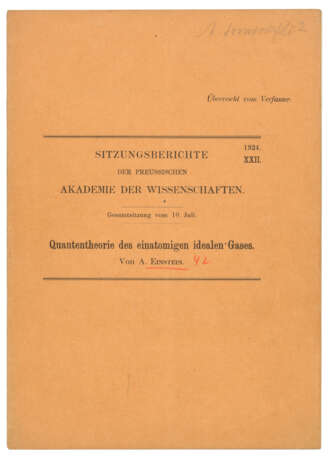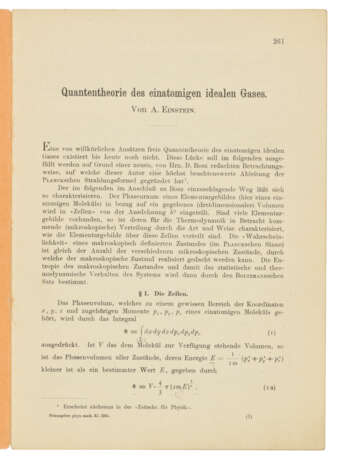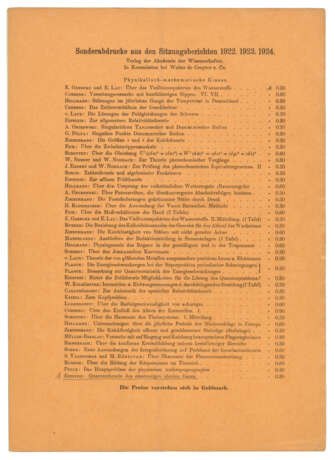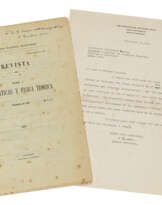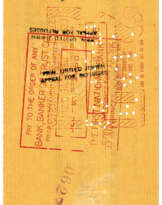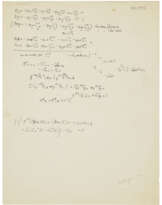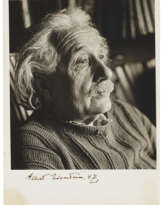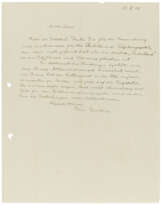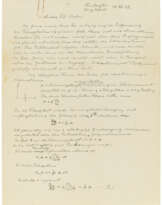ID 1349685
Lot 162 | EINSTEIN, Albert (1879-1955)
Estimate value
£ 5 000 – 7 000
‘Quantentheorie des einatomigen idealen Gases.’ Offprint from: Sitzungsberichte der Preussichen Akademie der Wissenschaften, Phys.-math. Klasse vol. XXII. Berlin: 1924
Very rare first edition, author's offprint issue, of Einstein’s groundbreaking work that reshaped the general academic consensus on quantum mechanics, from the library of the pioneering theoretical physicist Arnold Sommerfeld (1868-1951). Building on Indian physicist Satyendra Nath Bose’s statistical methods, Einstein theorised that under extremely low temperatures, particles in a gas could condense into the same quantum state, a phenomenon now known as Bose-Einstein condensation. This prediction significantly departed from classical physics by suggesting that quantum behaviours could emerge on a large, observable scale. Einstein’s work laid the foundation for quantum statistical mechanics, influencing fields such as superfluidity, atomic physics, and modern quantum computing. His predictions were proven in 1995 when Bose-Einstein condensates were created in the lab by Eric Cornell and Carl Wieman, marking a significant moment in the history of physics. This historical significance highlights quantum mechanics’ ability to explain the behaviours of matter in extreme conditions. Einstein published a second part to this paper in 1925, not present here.
Arnold Sommerfeld was a German theoretical physicist who made significant contributions to atomic and quantum physics. He extended Niels Bohr's atomic model by introducing elliptical orbits for electrons and proposed additional quantum numbers, including the azimuthal and magnetic quantum numbers. Sommerfeld also introduced the fine-structure constant, contributed to X-ray wave theory, and co-discovered the Sommerfeld-Wilson quantization rules. His seminal work ‘Atombau und Spektrallinien’ became a foundational text for the new generation of physicists developing atomic and quantum physics. Sommerfeld was an exceptional educator, mentoring 7 Nobel Prize winners and numerous other prominent physicists. Despite being nominated for the Nobel Prize a record 84 times, he never received the award. Nevertheless, he was honoured with several prestigious accolades, including the Lorentz Medal, the Max-Planck Medal, and the Oersted Medal, and was elected to numerous scientific academies worldwide. In 1918, Sommerfeld succeeded Einstein as chair of the Deutsche Physikalische Gesellschaft, and in 1922 Einstein wrote to his successor: ‘What I especially admire about you is that you have, as it were, pounded out of the soil such a large number of young talents' (A. Pais, ‘Subtle is the Lord...’: The Science and Life of Albert Einstein, 1982).
This author’s offprint can be distinguished from the normal ‘trade’ edition by the statement ‘Überreicht vom Verfasser’ on the wrapper. Very rare as author’s offprint; we have only been able to trace one copy at auction, Swann Galleries, 10 February 1994, lot 19 (RBH/ABSAA). BRL 149; Weil *142.
Octavo (255 x 180mm). Paginated 261-267 (faint ink stain on p.267). Original printed wrappers (very faint central vertical creasefold). Provenance: Arnold Sommerfeld (pencil ownership inscription and red chinagraph numbering and underlining on upper wrapper, pencil annotations to equations on pp.261, 262, 263, 264, and 265, as well as pencil markings on p.267).
| Artist: | Albert Einstein (1879 - 1955) |
|---|---|
| Place of origin: | Western Europe, Germany, Europe |
| Auction house category: | Medicine & science, Books and manuscripts, Printed books |
| Artist: | Albert Einstein (1879 - 1955) |
|---|---|
| Place of origin: | Western Europe, Germany, Europe |
| Auction house category: | Medicine & science, Books and manuscripts, Printed books |
| Address of auction |
CHRISTIE'S 8 King Street, St. James's SW1Y 6QT London United Kingdom | |
|---|---|---|
| Preview |
| |
| Phone | +44 (0)20 7839 9060 | |
| Buyer Premium | see on Website | |
| Conditions of purchase | Conditions of purchase |
